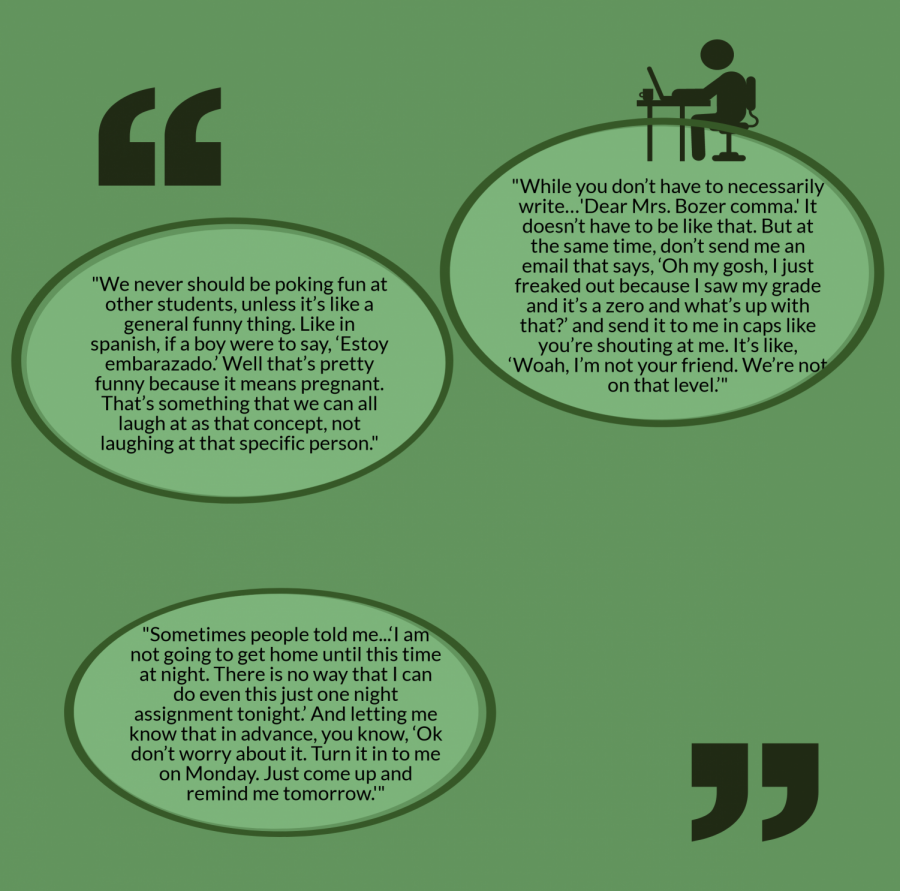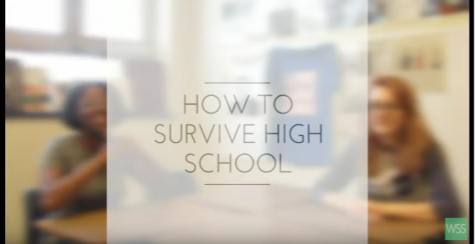Teresa Bozer
West Side Story (WSS): How would you advise students to ask for help?
Teresa Bozer (TB): The first thing that people should do always is raise their hand in class if they’ve got a question because it not only helps you personally, but it helps the other people who maybe are too scared to ask the question. Everybody’s been scared at some point to ask the question. It’s about ripping the Band-Aid off and “Okay, here’s my question.” I’ve even started . . . recommending that people kind of reiterate “Okay, I understood that you said [this],” so kind of echoing what teachers say to show that you’re listening. And then saying, “But this is where I’ve got the issue” . . . Then, if you feel like that wasn’t enough or “I’ve got bigger problems than that. I feel like everybody else understands this. I need help,” then go and make arrangements with that teacher outside of class and say, “Hey, I’m having trouble with this” and stop and see the teacher before or after class and ask if you can make an appointment to come in.
WSS: How would you want a student to approach you if they’re going to be gone?
TB: Teachers can treat this differently because every subject is different. In a case like mine, where it’s very fluid, I know where we’re going, I know what we’re doing, but I don’t how far we’ll get from day to day. Because I can have it planned, where I see that there’s a problem, we might slow down, and I don’t get to everything. I can’t always anticipate what it is. For me personally, I want students to come and let me know as soon as they know, and let’s say that’s three weeks out, I will just say, “Keep reminding me every week” . . . and so as we approach that date, if there’s something I can give you, I’ll give it to you. If there’s not anything that I can give you, I’ll say, “Okay, let’s just take care of it on the back end.”
The first thing that people should do always is raise their hand in class if they’ve got a question because it not only helps you personally, but it helps the other people who maybe are too scared to ask the question. Everybody’s been scared at some point to ask the question.
— Teresa Bozer
WSS: Do you prefer face to face rather than email or do you not care?
TB: For me personally, I don’t mind either way. It’s usually much more efficient when we do face to face . . . because it’s much easier to negotiate….
WSS: How should students go about sending an email to a teacher? How formal?
TB: I would say semi-formal. While you don’t have to necessarily write ”Dear Mrs. Bozer,” … don’t send me an email that says “Oh my gosh, I just freaked out because I saw my grade and it’s a zero and what’s up with that?” and send it to me in caps like you’re shouting at me. It’s like, “Whoa, I’m not your friend. We’re not on that level.” So somewhere in the middle which is “Hey, I happened to notice in PowerSchool that I have a 1 out of 10 . . . on this assignment. Was that not worth one point?” Check with me. Don’t blame. Ask in a polite way because we’re human too and nobody likes being blamed for anything.
WSS: How should students go about explaining that they didn’t get their work done?
TB: I kind of set a policy, especially with my lower level classes, where we have homework on a daily basis. We do a homework parade and if you don’t have your homework, you just tell me, “I don’t have my homework,” and if I want to discuss it with you, I’ll stop you. I’m not going to sweat it. Just go back to your seat. And after so many, we have conversations and stuff. If it’s a one-time event, and it’s like, “Oops, I just forgot,” don’t give me the big shaggy dog story. If however, it’s something like, “Last night, my grandma got sick and was in the hospital. I couldn’t do my homework.” Then talk to me before or after class, send me an email, let me know in some way shape or form that there was some extenuating circumstance, so I can take that into consideration.
WSS: How should students go about getting an extension on an assignment?
TB: If there’s an extenuating circumstance, I’m human. I’ll listen to you. Let’s say it’s a project that you have to do or a presentation, then there’s a grade deduction. But if it’s a one-night homework thing, there’s generally no extensions except for “Last night, I was at the hospital because so and so was sick.” Or sometimes people told me, “I am not going to get home until this time at night. There is no way that I can do even this just one-night assignment tonight.” And let me know that in advance, you know, “Okay, don’t worry about it. Turn it into me on Monday. Just come up and remind me tomorrow.”
“I have empathy, I can feel for your situation. If I understand and I have a trust in you, then ok. But if all of a sudden your nine grandmas died, well then that’s a different story.”
— Teresa Bozer
WSS: How should students go about asking for a bump up in their grade?
TB: What has the teacher outlined in the syllabus? Earlier than later. If you know that you’re a borderline person, then ask about that policy early in the year when the teacher publishes the syllabus. Sometimes it feels like Black Friday, those crazy sales that they have and everybody rushing to get the most popular whatever . . . and then there’s just this onslaught of people fighting for this. [It] gets to be like that at the end of the trimester with everybody asking. I’ll even mention a couple weeks out, “Okay, so we are getting toward the end of the trimester. Let me remind you how I do this.” And people will still come ask . . . Am I going to turn somebody away who asked me? No. But I personally hold the line on what I set forth on that policy in order to be fair [to] everybody. But if you do go ask in the politest way possible nothing shuts a teacher down faster than “I’ve got an 89.4, so can I get an A? Can you round that up to an A?” . . . This is a situation where you want to make an outside appointment because you want to go gently and have a nice conversation with the teacher, not one that’s either going to scar you or scar the teacher.
WSS: Are you completely against rounding people up or will you think about it?
TB: I round at .5. That’s what I do. So if somebody’s at .4, I guess I’m a math or analytical type of person that I’ve got to let the numbers speak for itself because your grade is not just one test, it’s not just one assessment. Your grade for the trimester is like a collage of all the work that you’ve done during the trimester and not just at one point in time. So I have to let the numbers speak for itself.
WSS: How can students joke around without going too far?
TB: There are some that can go too far. There have been those cases. I will point that out. But I think at the beginning of the year everybody’s a little bit more cautious on how jokey you can be . . . I’m all for a giggle, something that’s funny, but then we have to get back to what we need to do . . . I would say there are also certain things that are taboo in order to create an environment that is safe for everybody to express themselves, especially in a language. We never should be poking fun at other students, unless it’s like a general funny thing. Like in Spanish, if a boy were to say ‘estoy embarazado.’ Well, that’s pretty funny because it means pregnant. That’s something that we can all laugh at as [a] concept, not laughing at that specific person.
WSS: What are the best ways to get on a teacher’s good or bad side?
TB: Bad side is the grade thing and doing the blame thing or yelling at a teacher through the mail . . . To get on the good side would be to ask questions. Ask questions in class. Show good listening skills because there are also those questions that are the bad questions.





